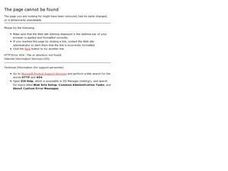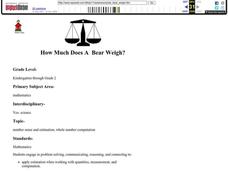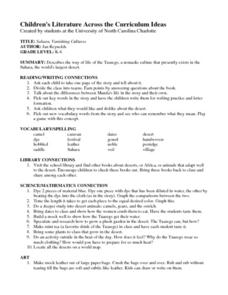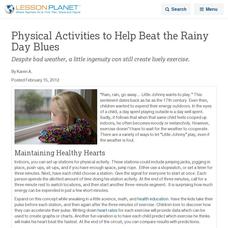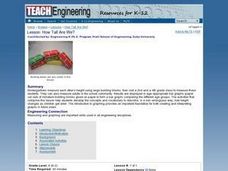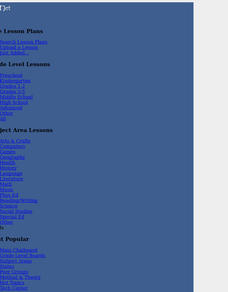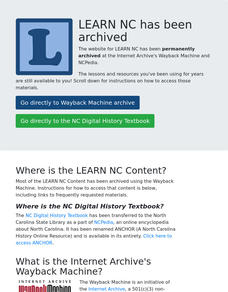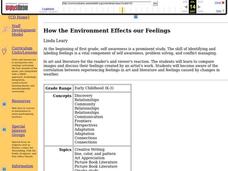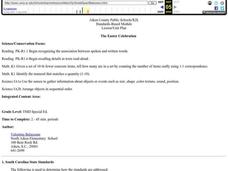Curated OER
Pondering the Perfect Pet
Cute, playful, mischievous pets will capture the attention of even your most reluctant learners.
Curated OER
The Nesting Habits of Folders
Students create an organized web of nested grade level folers. Within each grade level folder, they create a Language Arts/Social Studies folder and a Math/Science folder. All folders be color coded.
Curated OER
Maggie's Earth Adventures Unit
Students practice math, science, Spanish, and grammar skills using computer based activities in this unit of lessons. They experience lessons at different levels while tracking their progress using the attached progress chart.
Curated OER
How Much Does a Bear Weigh?
Students estimate how many children in their class it would take to equal the mass of one adult bear. They then weigh and record their measurement on a chart to check their estimate.
Curated OER
What Comes From Corn
Students name and examine various items that are made from corn. Students compare ears of corn to Indian corn, and cook several items made from corn. Students create a popcorn picture and illustrate a book.
Curated OER
Children's Literature Across the Curriculum Ideas-Sahara, Vanishing Cultures
Pupils read Sahara, Vanishing Cultures by Jan Reynolds. They complete a variety of cross-curricular activities surrounding the study nomadic cultures. Included are reading, art, math, science, writing, social studies, and library...
Curated OER
How to Beat the Rainy Day Blues
With a little ingenuity, lively exercise can occur despite the weather.
Curated OER
Com-Post With Us? Learn About Recycling While Having Fun
Young scholars examine the importance of recycling to help the environment. In groups, they make a compost bin on the school grounds recording how the material changes from week to week. They collect other materials for recycling like...
Curated OER
DAY AND NIGHT
Students use a lamp as the sun and his/her body as the earth. They rotate in different directions to explain how the earth moves around the sun. Using specific questions in their discussion, students discover the reasons for day and night.
Curated OER
How Tall Are We?
Students in a Kindergarten class measure each other's height using large building blocks and then visit a 2nd and a 4th grade class to measure those students. They display the results in bar graphs, comparing the different age groups.
Curated OER
Dinosaurs - Creatures Of The Past
Pupils use the Internet to search for dinosaurs, then distinguish between meat-eating and plant-eating dinosaurs. They explore theories about the extinction of dinosaurs and create illustrations of dinosaurs using Kid Pix or other...
Curated OER
A Worm World
Young scholars maintain a compost bin and build a worm observatory. They design experiments relating to worms and record observations in a worm journal.
Curated OER
Who Needs What?
Learners identify the physical needs of animals and if plants need the same things as animals. They conduct an experiment to see if plants need light and water to grow. They compare the growth of the plants exposed to the different...
Curated OER
How big is a whale
Students research the size of whales using print books or the internet. Students do the research in groups. They compare and graph the results.
Curated OER
Chilly Discoveries
First graders make ice cream and determine what makes this liquid turn into a solid.
Curated OER
How the Environment Effects our Feelings
First graders compare images and discuss their feelings created by an artist's work. They explore the correlation between experiencing feelings in art and literature and feelings caused by changes in weather.
Curated OER
The Easter Celebration
Students read a short story about Easter. They recognize and point to pictures of the key words (egg, chicken, rabbit, basket, flower). They make an Easter basket and count how many chickens can fit inside. They also practice identifying...
Curated OER
Penguins and Their Habitats
First graders research and observe penguins in their natural habitats. They conduct Internet research, complete a penguin WebQuest, and compile information on a selected type of penguin. Using their research information they create a...
Curated OER
Let's Build
Learners listen as the teacher differentiates between natural and people-made items. They go outside and make lists of natural and people-made things they see. Students complete the linked worksheet by cutting and pasting as suggested by...
Curated OER
Rubber Gardens
Students recycle discarded automobile tires and create gardening sites for limited space areas.
Curated OER
Drink It Up!
Students investigate how the human body needs water by recording their water consumption for a day. They sing a song about drinking water, make and drink Kool-Aid and eat apple slices, and conduct an experiment to determine how much...
Curated OER
Happy the Fish
Students explore the ways in which people's actions affect fish. They discuss pollutants that are in the water. Students define the terms chemicals, cooling pond, and pollutant. They create a book about Happy the Fish.
Curated OER
Sorting
Young scholars explore how to logically sort and store information in order to make it easy to manage and easily retrieved. They explore methods they can use to organize and manage information.

